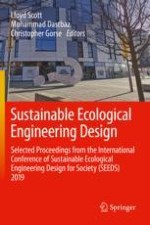2020 | OriginalPaper | Chapter
Serious Games for the Built Environment: Eco Material Trumps
Author : John Lester Clarke
Published in: Sustainable Ecological Engineering Design
Publisher: Springer International Publishing
Activate our intelligent search to find suitable subject content or patents.
Select sections of text to find matching patents with Artificial Intelligence. powered by
Select sections of text to find additional relevant content using AI-assisted search. powered by
